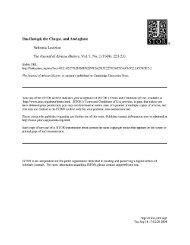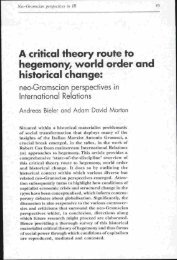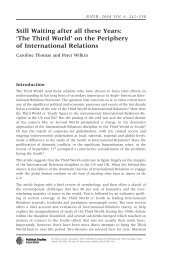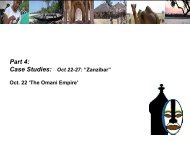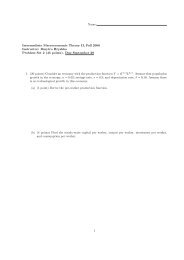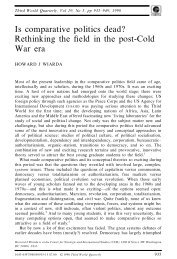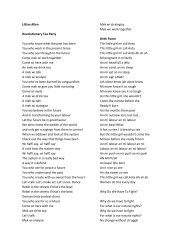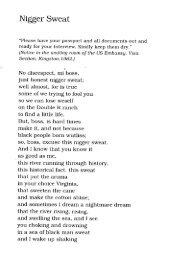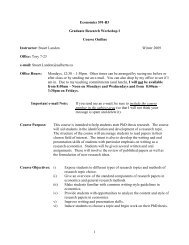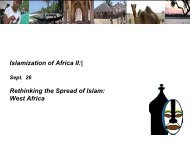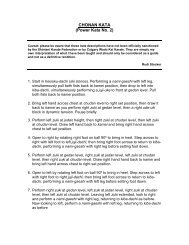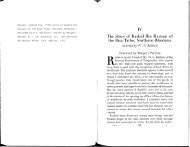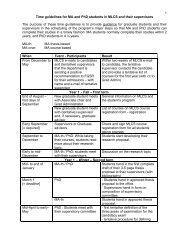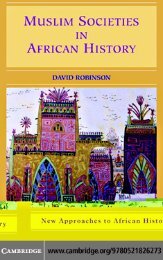personal memories revolutionary states and indian ocean migrations
personal memories revolutionary states and indian ocean migrations
personal memories revolutionary states and indian ocean migrations
You also want an ePaper? Increase the reach of your titles
YUMPU automatically turns print PDFs into web optimized ePapers that Google loves.
settler’s feet are never visible,<br />
except perhaps in the sea …The<br />
town belonging to the colonized<br />
people, or at least the native<br />
town, the Negro village, the<br />
medina, the reservation, is a place<br />
of ill-fame, peopled by men of<br />
evil repute. They are born there,<br />
it matters little where <strong>and</strong> how<br />
they die there; it matters not<br />
where, nor how. It is a world<br />
without spaciousness; men there<br />
live on top of each other… The<br />
native town is a crouching village,<br />
a town on its knees, a town<br />
wallowing in the mire. It is a<br />
town of niggers <strong>and</strong> dirty Arabs.<br />
LeVine’s intervention is not<br />
strictly that of the revisionist school. He<br />
is concerned with the question of<br />
whether the colonized can ever be<br />
modern <strong>and</strong> how modern history can be<br />
written. He does so by looking at the<br />
interstices, physical <strong>and</strong> discursive,<br />
between the two cities. Neither Tel<br />
Avivian nor Jaffan purity is what is<br />
characteristic about each city but the<br />
economic, ideological, <strong>and</strong> psychological<br />
reliance on each other’s Other. The<br />
criticism that this kind of work conjures<br />
up is a larger, scholarly-activist one<br />
which is finding it difficult to<br />
emancipate itself from the object of its<br />
criticism: Theoretically ‘cutting-edge’ if<br />
convoluted for the uninitiated, the<br />
historical actors in whose<br />
underrepresented name new histories<br />
are written appear as marionettes on the<br />
stage where the real protagonists are the<br />
authors. Can postcolonial criticism ever<br />
be more than a commentary on the<br />
constructs of exclusive history, can it be<br />
a self-sustained inclusive history that<br />
fully ‘overthrows’ Eurocentric, colonial<br />
or racist histories? Overthrowing Geography<br />
has not been able to replace or<br />
supercede the reference system it aimed<br />
to deconstruct. In spite of its theoretical<br />
appeal <strong>and</strong> inspiring intersticiality, those<br />
readers interested in the daily operations<br />
of both cities are left, reluctantly, to<br />
http://web.mit.edu/cis/www/mitejmes/<br />
99<br />
recur to traditional accounts – silences<br />
<strong>and</strong> all – such as Joachim Schlör’s 1999<br />
Tel Aviv; From Dream to City, which,<br />
surprisingly, is unreferenced in LeVine’s<br />
book. Meanwhile 20 th century Jaffa still<br />
awaits its history to be written in<br />
English.<br />
_______________________________<br />
Halliday, Fred<br />
Two Hours that Shook the World--<br />
September 11, 2001: Causes &<br />
Consequences<br />
London: Saqi Books, 2002.<br />
Reviewed By Amir Asmar ∗<br />
Only two chapters (1 <strong>and</strong> 12) of<br />
Fred Halliday’s Two Hours that Shook the<br />
World, along with the Introduction <strong>and</strong><br />
Conclusion, were written after the<br />
terrorist attacks of 11 September 2001.<br />
Consequently, the book feels somewhat<br />
disjointed. Although replete with<br />
valuable information <strong>and</strong> analytical<br />
insights, it seems two books: one written<br />
to discuss the causes <strong>and</strong> consequences<br />
of the 11 September attacks, <strong>and</strong><br />
another to highlight a variety of issues in<br />
the Muslim world <strong>and</strong> its relations with<br />
the West. It is on the former that this<br />
review will focus because, while the<br />
issues of the relationship between the<br />
Muslim <strong>and</strong> Western worlds are<br />
undoubtedly related to the events of 11<br />
September, Halliday does not explicitly<br />
connect many of his pre-11 September<br />
sections to the attacks themselves or to<br />
the sections written specifically to<br />
discuss them.<br />
Halliday outlines the<br />
shortcomings of this work—<strong>and</strong><br />
articulates a familiar thesis—early in the<br />
introduction: “This collection is a<br />
∗ Amir Asmar, a graduate of the University of<br />
Chicago's Center for Middle East Studies, has<br />
been a Middle East specialist for the US<br />
Department of Defense for over fifteen years.<br />
The views expressed in this review do not reflect<br />
the official policy or position of the Department<br />
of Defense or the US Government.



